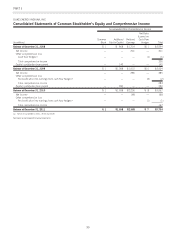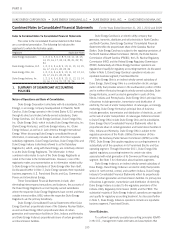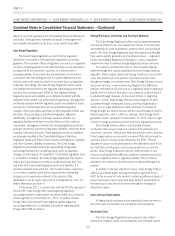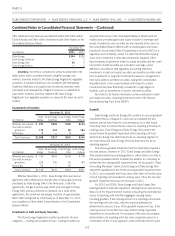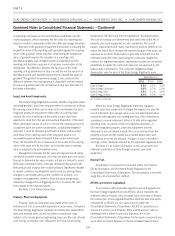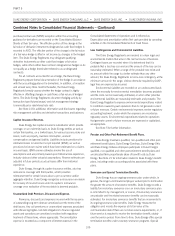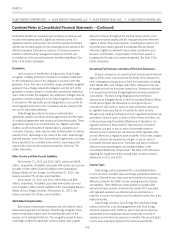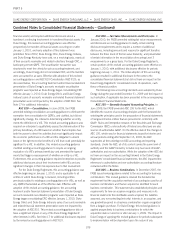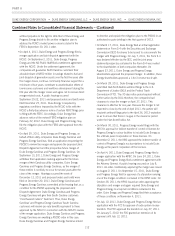Duke Energy 2011 Annual Report Download - page 127
Download and view the complete annual report
Please find page 127 of the 2011 Duke Energy annual report below. You can navigate through the pages in the report by either clicking on the pages listed below, or by using the keyword search tool below to find specific information within the annual report.
PART II
DUKE ENERGY CORPORATION •DUKE ENERGY CAROLINAS, LLC •DUKE ENERGY OHIO, INC. •DUKE ENERGY INDIANA, INC.
Combined Notes to Consolidated Financial Statements – (Continued)
Subsidiary Registrants would incur if the Subsidiary Registrants were
a separate company filing their own federal tax return as a
C-Corporation. The Duke Energy Registrants record unrecognized tax
benefits for positions taken or expected to be taken on tax returns,
including the decision to exclude certain income or transactions from
a return, when a more-likely-than-not threshold is met for a tax
position and management believes that the position will be sustained
upon examination by the taxing authorities. Management evaluates
each position based solely on the technical merits and facts and
circumstances of the position, assuming the position will be
examined by a taxing authority having full knowledge of all relevant
information. The Duke Energy Registrants record the largest amount
of the unrecognized tax benefit that is greater than 50% likely of
being realized upon settlement or effective settlement. Management
considers a tax position effectively settled for the purpose of
recognizing previously unrecognized tax benefits when the following
conditions exist: (i) the taxing authority has completed its examination
procedures, including all appeals and administrative reviews that the
taxing authority is required and expected to perform for the tax
positions, (ii) the Duke Energy Registrants do not intend to appeal or
litigate any aspect of the tax position included in the completed
examination, and (iii) it is remote that the taxing authority would
examine or reexamine any aspect of the tax position. Deferred taxes
are not provided on translation gains and losses where the Duke
Energy Registrants expect earnings of a foreign operation to be
indefinitely reinvested.
The Duke Energy Registrants record, as it relates to taxes,
interest expense as Interest Expense and interest income and
penalties in Other Income and Expenses, net, in the Consolidated
Statements of Operations.
See Note 22 for further information.
Accounting for Renewable Energy Tax Credits and Grants Under
the American Recovery and Reinvestment Act of 2009.
In 2009, The American Recovery and Reinvestment Act of
2009 (the Stimulus Bill) was signed into law, which provides tax
incentives in the form of ITC or cash grants for renewable energy
facilities and renewable generation property either placed in service
through specified dates or for which construction has begun prior to
specified dates. Under the Stimulus Bill, Duke Energy may elect an
ITC, which is determined based on a percentage of the tax basis of
the qualified property placed in service, for property placed in service
after 2008 and before 2014 (2013 for wind facilities) or a cash
grant, which allows entities to elect to receive a cash grant in lieu of
the ITC for certain property either placed in service in 2009 or 2010
or for which construction begins in 2009 and 2010. In 2010, the
Tax Relief, Unemployment Insurance Reauthorization, and Job
Creation Act of 2010 (the 2010 Tax Relief Act) extended the cash
grant program for renewable energy property for one additional year,
through 2011. When Duke Energy elects either the ITC or cash grant
on Commercial Power’s wind facilities that meet the stipulations of
theStimulusBill,DukeEnergyreducesthebasisoftheproperty
recorded on the Consolidated Balance Sheets by the amount of the
ITC or cash grant and, therefore, the ITC or grant benefit is recognized
ratably over the life of the associated asset through reduced
depreciation expense. Additionally, certain tax credits and government
grants received under the Stimulus Bill provide for an incremental
initial tax depreciable base in excess of the carrying value for GAAP
purposes, creating an initial deferred tax asset equal to the tax effect
of one half of the ITC or government grant. Duke Energy records the
deferred tax benefit as a reduction to income tax expense in the
period that the basis difference is created.
Excise Taxes.
Certain excise taxes levied by state or local governments are
collected by the Duke Energy Registrants from its customers. These
taxes, which are required to be paid regardless of the Duke Energy
Registrants’ ability to collect from the customer, are accounted for on
a gross basis. When the Duke Energy Registrants act as an agent,
and the tax is not required to be remitted if it is not collected from the
customer, the taxes are accounted for on a net basis. The Duke
Energy Registrants’ excise taxes accounted for on a gross basis and
recorded as operating revenues in the accompanying Consolidated
Statements of Operations were as follows:
Year Ended December 31,
(in millions) 2011 2010 2009
Duke Energy Carolinas $153 $156 $132
Duke Energy Ohio 109 115 117
Duke Energy Indiana 31 29 27
Total Duke Energy $293 $300 $276
Foreign Currency Translation.
The local currencies of Duke Energy’s foreign operations have
been determined to be their functional currencies, except for certain
foreign operations whose functional currency has been determined to
be the U.S. Dollar, based on an assessment of the economic
circumstances of the foreign operation.Assets and liabilities of foreign
operations, except for those whose functional currency is the
U.S. Dollar, are translated into U.S. Dollars at the exchange rates at
period end. Translation adjustments resulting from fluctuations in
exchange rates are included as a separate component of AOCI.
Revenue and expense accounts of these operations are translated at
average exchange rates prevailing during the year. Gains and losses
arising from balances and transactions denominated in currencies
other than the functional currency are included in the results of
operations in the period in which they occur.
Statements of Consolidated Cash Flows.
The Duke Energy Registrants have made certain classification
elections within their Consolidated Statements of Cash Flows. Cash
flows from discontinued operations are combined with cash flows
107




